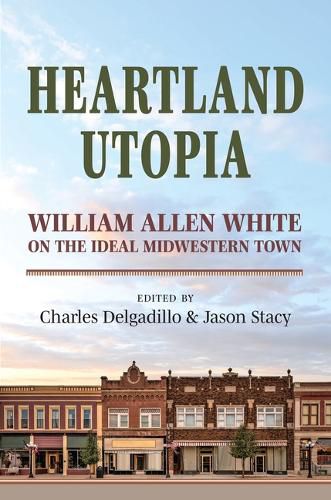Readings Newsletter
Become a Readings Member to make your shopping experience even easier.
Sign in or sign up for free!
You’re not far away from qualifying for FREE standard shipping within Australia
You’ve qualified for FREE standard shipping within Australia
The cart is loading…






For William Allen White, the ideal Midwestern community was a utopian vision of what America could be: a prosperous, happy community built on equality, opportunity, and neighborly generosity. This anthology collects White's famous and obscure writings and presents him as the iconic voice of the Midwestern small town.
William Allen White, the editor of the Emporia, Kansas Gazette, was an American institution. When he died in 1944, President Franklin Delano Roosevelt commented that America had lost one of its "wisest and most beloved editors." White understood the value of his unique brand as "The Voice of Main Street," and would often preach his vision of the kind of nation the United States ought to be. From his view in Emporia, White's imagined Midwestern town was a dream for the nation to strive toward. He saw himself as a pioneer sowing the seeds of a great harvest to come, and he believed that the small-town civilization he venerated exemplified what was best in America.
In Heartland Utopia, Charles Delgadillo and Jason Stacy have gathered nearly twenty-five years of White's fiction and nonfiction, focused on his idealized Midwestern community and how this utopian vision changed over time.
$9.00 standard shipping within Australia
FREE standard shipping within Australia for orders over $100.00
Express & International shipping calculated at checkout
Stock availability can be subject to change without notice. We recommend calling the shop or contacting our online team to check availability of low stock items. Please see our Shopping Online page for more details.
For William Allen White, the ideal Midwestern community was a utopian vision of what America could be: a prosperous, happy community built on equality, opportunity, and neighborly generosity. This anthology collects White's famous and obscure writings and presents him as the iconic voice of the Midwestern small town.
William Allen White, the editor of the Emporia, Kansas Gazette, was an American institution. When he died in 1944, President Franklin Delano Roosevelt commented that America had lost one of its "wisest and most beloved editors." White understood the value of his unique brand as "The Voice of Main Street," and would often preach his vision of the kind of nation the United States ought to be. From his view in Emporia, White's imagined Midwestern town was a dream for the nation to strive toward. He saw himself as a pioneer sowing the seeds of a great harvest to come, and he believed that the small-town civilization he venerated exemplified what was best in America.
In Heartland Utopia, Charles Delgadillo and Jason Stacy have gathered nearly twenty-five years of White's fiction and nonfiction, focused on his idealized Midwestern community and how this utopian vision changed over time.